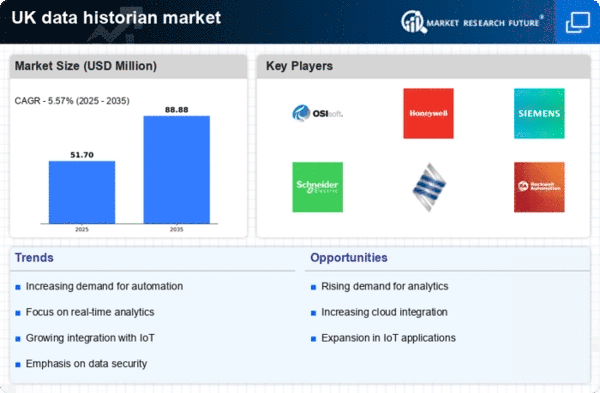Expansion of Industrial Automation
the data historian market is growing due to the expansion of industrial automation in the UK.. As companies invest in automated systems and smart technologies, the need for comprehensive data management solutions becomes paramount. Automation generates vast amounts of data that require effective storage, analysis, and retrieval, which data historian systems are designed to provide. It is anticipated that the industrial automation market will grow at a CAGR of over 10% in the coming years, further driving the demand for data historian solutions. This trend indicates a symbiotic relationship between automation and data management, positioning the data historian market as an essential player in the automation landscape.
Rising Demand for Real-Time Data Analysis
The data historian market is experiencing a notable surge in demand for real-time data analysis capabilities. Industries such as manufacturing, energy, and utilities are increasingly reliant on instantaneous data insights to enhance operational efficiency and decision-making processes. This trend is underscored by the fact that approximately 70% of UK businesses are prioritising real-time analytics to remain competitive. As organisations seek to optimise their operations, the data historian market is positioned to benefit from this growing need for immediate data accessibility and analysis. Furthermore, the integration of advanced analytics tools within data historian systems is likely to drive innovation, enabling companies to harness data more effectively and improve their overall performance.
Emergence of Advanced Analytics Technologies
the data historian market is shaped by advanced analytics technologies., including machine learning and artificial intelligence. These technologies enable organisations to extract deeper insights from historical data, facilitating more informed decision-making. As businesses in the UK increasingly adopt these advanced analytics capabilities, the demand for data historian solutions that can seamlessly integrate with such technologies is likely to grow. It is estimated that the market for advanced analytics will reach £20 billion by 2026, indicating a substantial opportunity for data historian providers. This trend suggests that the data historian market will not only evolve but also play a pivotal role in the broader analytics ecosystem.
Increased Regulatory Compliance Requirements
The data historian market is significantly influenced by the evolving landscape of regulatory compliance in the UK. With stringent regulations governing data management and security, industries such as pharmaceuticals and finance are compelled to adopt robust data historian solutions. The market is projected to grow as organisations invest in systems that ensure compliance with regulations such as GDPR and industry-specific standards. It is estimated that compliance-related investments could account for up to 30% of IT budgets in these sectors. Consequently, the data historian market is likely to expand as businesses seek to mitigate risks associated with non-compliance and enhance their data governance frameworks.
Growing Adoption of Predictive Maintenance Strategies
the data historian market is shifting towards predictive maintenance strategies., particularly in sectors like manufacturing and transportation. By leveraging historical data, organisations can anticipate equipment failures and optimise maintenance schedules, thereby reducing downtime and operational costs. Reports indicate that predictive maintenance can lead to cost savings of up to 25% in maintenance expenses. As industries increasingly recognise the value of data-driven decision-making, the demand for data historian solutions that support predictive analytics is expected to rise. This trend not only enhances operational efficiency but also positions the data historian market as a critical component in the broader context of Industry 4.0 initiatives.
















